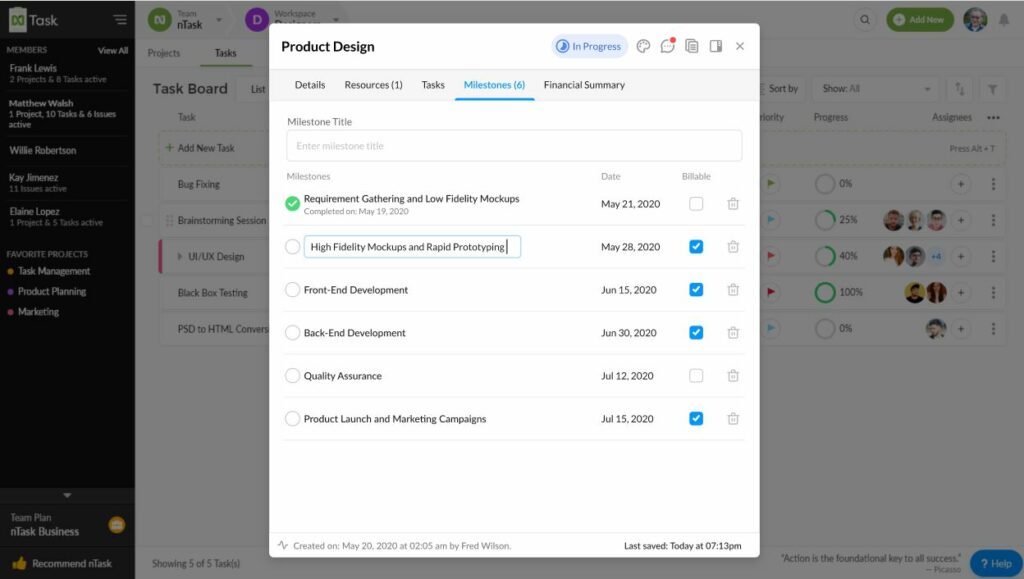Project milestones are an important part of every project, and they can help to keep everyone on track. They provide a clear framework for what is expected of team members, and they can help to ensure that the project deadline is met.
In this article, we’ll explain what a project milestone is, and we’ll provide tips on how to define them in a timely and effective way. Ready to get started? Let’s go!
What Is Project Milestone?
A milestone is an important event or marker in a project that signifies that the project has reached a certain stage.
There are different types of milestones, but the most common ones are achievement, integration, and delivery.
An achievement milestone is when a project achieves its objectives – it’s usually marked by a celebratory event or celebration.
An integration milestone is when all the pieces of the project have been put together and work smoothly together – this often happens after the achievement milestone.
Delivery milestones are when the final product or service is ready for use – this can happen at any stage after integration but may be marked by a public launch or other significant events.
The Different Types Of Project Milestones

There are a few different types of project milestones that you’ll likely encounter when working on a project. Here are the most common ones:
- Milestone attainment: This is the moment when your project officially completes its objectives and meets all the requirements that were set out at the beginning.
- Milestone release: This is the point in time when you release your project to the public or to specific groups of people. It’s also the point at which you celebrate your success!
- Milestone review: This is a key stage in the project lifecycle where you assess how well your project has performed and make any necessary changes or improvements.
- Milestone notification: This is an important stage in order to keep stakeholders informed about important developments within your project.
Why Are Project Milestones Important?
Project milestones are important because they help to ensure that the project is on track and moving forward in the right direction.
When setting milestones, it’s important to be realistic and mindful of the time and resources that will be required to complete them. It’s also important to keep in mind the goal of the project – is it to finish it on time, or is it more important that it’s done well? Once you’ve determined these things, create a timeline that outlines when each milestone should be completed. This will help you stay on track and avoid any unnecessary delays or setbacks.
How To Create And Communicate Project Milestones Effectively?

Project milestones are a key part of any project and should be communicated to everyone involved as often as possible. This will help ensure that the project stays on track and is completed on time.
There are several ways to communicate project milestones:
- Use deadlines to motivate team members and keep them accountable. Deadlines give everyone a sense of urgency and help ensure that the project is completed on time.
- Set up specific checkpoints or points at which the project will be evaluated. This allows everyone involved to gauge their progress and makes sure that all expectations are met.
- Create a milestone chart or timeline to visualize your progress over time. This can be helpful in communicating complex concepts, and it can also act as a reminder for team members.
- Use blogs, social media, and other communication channels to share updates and progress reports with your target audience. This will keep them updated on the status of the project, while also creating interest in it among potential volunteers or investors.
Tips For Setting And Achieving Effective Project Milestones
Setting effective project milestones is an important part of ensuring that your projects are on track and moving forward in the right direction. Here are a few tips to help you achieve this:
- Make sure each milestone is relevant and important. Don’t set milestones that don’t have any impact on the project or don’t add value to it.
- Be realistic in your expectations, and don’t set milestones that you can’t realistically achieve.
- Set deadlines for each milestone, and make sure they’re achievable based on the resources available to you.
- Stick to the schedule, and don’t change it unless there’s a good reason to do so. If you miss a deadline, be prepared to face the consequences – including possible penalties or even termination of the project.
FAQS
What are goals and milestones?
When developing your goals, make sure that they are feasible and realistic; otherwise, it will be difficult to keep up the motivation necessary for achieving them. Additionally, set deadlines for yourself so that everything does not become overwhelming at once. And finally, let go of any negative thoughts or emotions about failing—this will only stall your progress further. Instead, chalk failures up as learning experiences that will lead to future successes!
How do you write a project milestone?
This will help ensure that everyone involved – from clients to team members – has clarity about where the project stands at any given time.
Additionally, keep in mind the importance of communication when working on projects. Make sure to provide regular updates so that all stakeholders are up-to-date on progress and changes related to the project. And finally, always aim to go above and beyond expectations by delivering quality work quickly and efficiently!
What are some good milestones?
What are the types of milestones?
Physical milestones often involve getting older (such as turning 18 or 21), reaching certain goals (like earning your college degree or starting a new job), and becoming pregnant/giving birth. Emotional milestones may include firsts such as moving out on your own, buying your first home, having kids, etc., while spiritual landmarks might include religious conversions, changes in philosophy/beliefs, etc.
No matter what type of milestone you’re looking for whether it be physical or emotional-it is always beneficial to celebrate them! Planning something special together with friends and family can make all the difference in terms of making these events feel extra special.
What are key development milestones?
By following these steps consistently, you will be able to build a successful company that stands the test of time.
Conclusion
You can now feel confident about setting up your own project milestones. All you need to do is put down all the tasks that are related to each milestone and assign responsibilities accordingly. Then, you can finally start celebrating the success of every project.
In case you have any queries regarding this article, don’t forget to leave a comment below!
